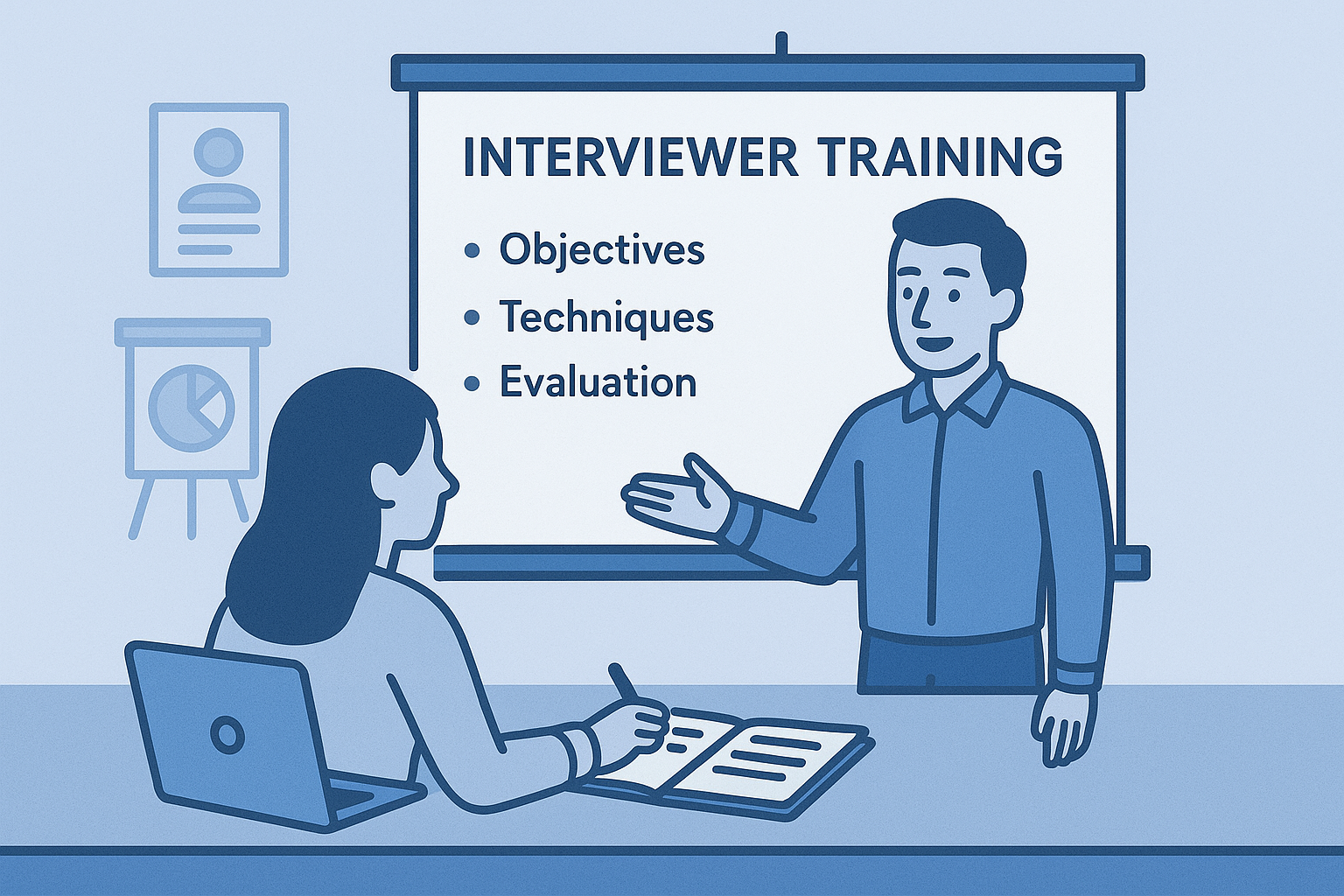Interviewer Training: How to Build Fair, Skilled, and Effective Hiring Teams
What is Interviewer Training?
Interviewer Training refers to the structured process of educating hiring managers, recruiters, and other interviewers on how to effectively conduct interviews.
It covers best practices in candidate evaluation, questioning techniques, bias reduction, legal compliance, and structured assessment methods.
Well-designed interviewer training is crucial for companies aiming to improve the quality of their hires, promote a better Candidate Experience, and maintain consistent, legally defensible hiring practices.
Why is Interviewer Training Important?
Training interviewers yields significant benefits:
Enhances Interview Consistency
Trained interviewers apply standardized evaluation criteria across all candidates, especially when using Structured Interview techniques.Reduces Bias
Education on unconscious bias helps interviewers make more objective decisions, improving fairness and diversity.Improves Hiring Accuracy
Proper questioning and assessment skills lead to better identification of candidates' actual competencies.Protects Against Legal Risks
Awareness of compliant questioning practices minimizes the risk of discriminatory or inappropriate interviews.Strengthens Employer Brand
Well-conducted interviews enhance the company's reputation in the talent market.

What Does Interviewer Training Typically Include?
Training Component | Description |
|---|---|
Understanding Job Requirements | Reviewing the Job Requisition to align interview focus areas. |
Effective Question Design | Crafting open-ended, behavioral, and skills-based questions relevant to the role. |
Structured Interview Techniques | Applying a consistent set of questions and evaluation methods to all candidates. |
Bias Awareness | Identifying and mitigating unconscious biases in decision-making. |
Candidate Evaluation | Learning how to use tools like a Candidate Evaluation Form or Candidate Scorecard. |
Legal Compliance | Avoiding prohibited questions about age, marital status, nationality, and other protected attributes. |
Communication Skills | Creating a positive, professional, and engaging interview experience for candidates. |
How to Build an Effective Interviewer Training Program
Set Clear Objectives
Define what competencies and knowledge interviewers should acquire after the training.Develop Role-Specific Content
Tailor training to the types of roles being hired, emphasizing appropriate skills assessments through Skills-Based Interviewing.Incorporate Practical Exercises
Include role-plays, mock interviews, and real-world scenarios to practice applying techniques.Provide Tools and Templates
Equip interviewers with templates such as standardized question sets and evaluation forms.Use Digital Learning Platforms
Offer on-demand modules or workshops, integrated into your Applicant Tracking System (ATS).Continuous Reinforcement
Conduct regular refresher courses and feedback sessions to keep skills sharp and processes aligned.
Common Mistakes in Interviewer Training
One-Size-Fits-All Approach
Training must be adapted to different job families and seniority levels.Overlooking Bias Education
Failing to address bias leaves interviewers vulnerable to unfair assessments.Ignoring Practical Application
Without hands-on practice, interviewers may struggle to implement techniques in real situations.Lack of Follow-Up
Training should not be a one-time event. Ongoing coaching and recalibration are necessary.
FAQ: Interviewer Training
Q1: Who should receive interviewer training?
A1: Anyone involved in evaluating candidates — hiring managers, HR representatives, and even team interviewers for panel assessments.
Q2: How often should interviewer training be updated?
A2: Ideally annually, or whenever major hiring process changes (such as introducing new evaluation methods) occur.
Q3: Can interviewer training improve time-to-hire?
A3: Yes. Well-trained interviewers make faster, more confident hiring decisions, reducing delays and improving efficiency across the Talent Pipeline.
Conclusion
Investing in Interviewer Training is essential for organizations seeking to build high-quality, diverse, and effective teams.
Structured, skills-based interviewing practices — reinforced by strong training — not only improve the accuracy of hiring decisions but also strengthen your employer brand and protect against compliance risks.
By prioritizing interviewer education, companies can unlock a smarter, fairer, and faster recruitment process that attracts and secures top talent.
From recruiting candidates to onboarding new team members, MokaHR gives your company everything you need to be great at hiring.
Subscribe for more information

